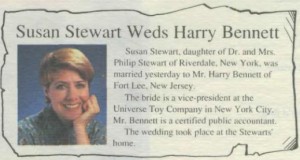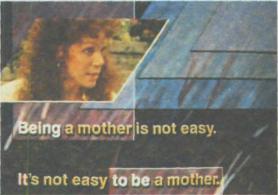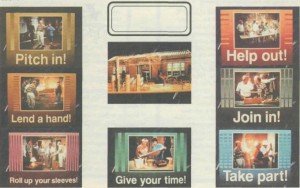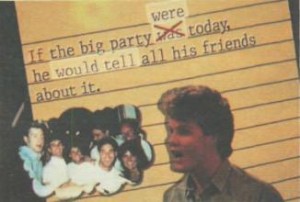Family Album USA 21 — A Big Fish in a Little Pond
Смотреть онлайн в хорошем качестве курс английского языка — сериал Family Album USA 21 серия “A Big Fish in a Little Pond” с английскими субтитрами и упражнениями:
In this episode, you will study…
VOCABULARY
alterations
jeans
exchange
garment
executive
dilemma
reputation
industry
sacrifice (noun)
considerate
GRAMMAR AND EXPRESSIONS
must have + past participle
indirect yes/no questions
idioms: better off
How’s that?
a big fish in a little pond
U.S. LIFE
- Do Americans often change their job or career?
- What is the Small Business Administration?
YOUR TURN
- How many jobs do you think you will have in your lifetime? How many careers?
- Would you rather work for a large corporation or for a small business?
Упражнения и словари к 21 серии Family Album USA:
Act 1
must’ve bought: obviously bought. Use must have (or must’ve) + a past participle to refer to something that obviously happened. Must have shows that you have evidence—a clear reason to believe something. Here, Susan says, «We must have bought the right size.» It is clear that they bought the right size because Michelle’s dress fits so well.
We couldn’t ask for anything more. = We are lucky to have everything we need.
go: move
jeans: pants, usually blue, made of heavy cotton material. Other names for jeans are blue jeans, dungarees, denims, denim jeans, or Levi’s.
We should’ve bought. . . = It’s too bad we didn’t buy. . . Use should have + a past participle to express a refer to say that you are sorry that something didn’t happen. (In Episode 24, you will study more about this point of grammar.)
exchange: to give one thing and get back another. Here, Harry means that they must exchange the small jacket for a bigger one.
garment: clothing
executive: a person with much power or responsibility in a company
FOR YOUR INFORMATION
The first company to make denim jeans was Levi Strauss & Co., in San Francisco. This company has been making jeans, or Levi’s, since 1853. Today, Levi Strauss & Co. is the largest clothing manufacturer in the world. This company has sold more than 2.5 billion pairs of jeans.
L.A.: Los Angeles. Many people use only the initials LA. to refer to this famous city in southern California.
U.S. LIFE
Many Americans change jobs during their lifetime. In fact, some Americans even change careers one or more times. For example, someone who has been a teacher for fifteen years might decide to quit that profession in order to begin a restaurant business. Or a banker might decide to go back to school to study law. You sometimes meet older Americans who have tried several careers in their lifetime.
YOUR TURN
- Do people in your country often change jobs? Do they often change careers?
- How many jobs do you think you will have in your lifetime? How many careers?
Activities
PRONUNCIATION AND GRAMMAR: MUST HAVE + PAST PARTICIPLE
Use must have + a past participle to refer to something that obviously happened. In conversation, must have, or must’ve, is often pronounced musta.
Must have shows that you have present evidence that something happened. For example, when Susan sees that Michelle’s new dress fits perfectly, she says, «We must’ve bought the right size.» In other words, it is clear that they bought the right size.
A. Complete each of the following sentences. Use must have + the past participle of the verb in parentheses. The first answer is given.

2. Michelle’s jacket was much too small. They ______ (buy) the wrong size.
3. Michelle looked worried when she came into the room. She _____ (see) the serious look on their faces. And she _____ (hear) Susan and Harry talking about moving to Los Angeles.
The negative form of must have is must not have. For example, since Susan is so surprised about the job offer, she and Harry must not have talked about it before. In other words, it is clear that they didn’t talk about it before.
B. Complete each of the following sentences about some new situations. Use must have—or must not have— + the past participle form of the verb in parentheses.
1. The streets are wet. It ____ (rain) last night.
2. He didn’t pass the test. He _____ (study) verv much.
3. Her coat isn’t in the closet. She ____ (go) home.
4. My keys aren’t in my pocket. I _____ (leave) them in my bag.
5. People are still waiting outside the theater. The movie _____ (begin) yet.
Act 2
I wonder if a move would be a bad thing for her. This is an indirect yes/no question form. The word if comes before the subject (a move). In a direct yes/no question (such as Would a move be a bad thing for her?), an auxiliary (such as would) comes before the subject.
reputation: what most people think about someone; why someone is well known or respected
industry: business. The toy industry refers to all the businesses that produce toys.
sacrifices: things you do not give yourself or do not do for yourself—in order to help someone else
from time to time: sometimes; once in a while
better off: in a better situation or condition
have a talk with: to talk seriously with
No point in (delaying). = There is no good reason (to delay).
delaying: waiting until later
once-in-a-lifetime. Use this phrase to refer to a wonderful opportunity.
Let me know by (the end of the week). = Tell me before (the end of the week).
I don’t want to interrupt her school year. Harry means that he doesn’t want Michelle to leave her present class before the end of the school term, or semester.
make the offer: to offer it. You may use to make an offer instead of to offer for business situations, such as a job offer.
Activities
INDIRECT YES/NO QUESTIONS
Direct yes/no quetions begin with an auxiliary before the subject. For example, Susan wonders, “Can I get a good job in Los Angeles?» (The auxiliary can comes before the subject I.)
Indirect yes/no questions begin with phrases such as / wonder if. . . or / don’t know if. … After if, do not put the auxiliary before the subject. For example, Susan tells Grandpa, «I don’t know if I can get a good job in Los Angeles.» (The auxiliary can comes alter the subject I.)
When a direct question begins with the auxiliary do, does, or did, the indirect question has no auxiliary after if. Study the following examples:
DIRECT INDIRECT
Do they want to move? → I’m not sure if they want to move.
Does he like the offer? → I don’t know if he likes the offer.
Did she know about it? → I wonder if she knew about it.
A. Read each of the following direct questions. Then complete the indirect question below each one. The first answer is given.
1. Will Harry take the job? I’m not sure if Harry will take the job.
2. Would a move be a bad thing for Michelle? I wonder _____ a bad thing for Michelle.
3. Does Susan want to leave New York? I don’t know _______ to leave New York.
4. Have thev talked about this before? I’d like to know ______ about this before.

1. Bill is wondering _______________________________.
2. He wants to know ____________________________.
3. He isn’t sure ____________________________.
Act 3
poster: a large sign put up in a public place
in a good mood: feeling good, for now
touched: affected emotionally
turn (it) down: refuse (it)
How’s that? = Excuse me? I don’t understand.
I’m a big fish in a little pond.
Harry means that his company is small, but he controls it. Use the phrase a big fish in a little pond to refer to someone who has a good position and doesn’t have competition from many other people. In other words, you might use this expression to refer to someone who has an important position in a small company. In a large company, this person probably would not be as important.
U.S. LIFE
Harry enjoys working for his own small business. The Small Business Administration is a U.S. government agency established in 1953. It lends money to small businesses to help them grow. The Small Business Administration also helps small businesses receive government contracts.
YOUR TURN
- Would you rather work for a large corporation or for a small business?
- What kind of small business might you like to own?
Activities
«A BIG FISH IN A LITTLE POND»
A. What Is the meaning of the underlined expression in each of the following lines from this episode? Circle a or b.
1. Susan: We couldn’t ask for anything more . . .
a. We have everything we need.’
b. We weren’t able to ask more questions.
2. Grandpa: . . . you have a fantastic reputation in the toy industry.
a. you work very hard
b. people respect you
3. Grandpa: In every marriage, sacrifices have to be made . . .
a. you have to live without (or give up) things
b. you have to build things
4. Susan: I’ll call him right now. No point in delaying.
a. Don’t talk about it.
b. There is no reason to wait.
5. Susan: That’s very considerate of you, Michelle.
a. kind
b. intelligent
6. Susan: I see you’re in a good mood.
a. feeling good
b. in perfect health
7. Harry: I am so touched.
a. holding you
b. feeling strong emotions
8. Susan: Harry, you didn’t turn it down because of me . . .
a. refuse the offer
b. accept a lower salary
9. Harry: I’m a big fish in a little pond.
a. important in my own small company
b. in a large company, but I’m not very important
B. Harry decides not to take the job in the big company because he likes being «a big fish in a little pond.» What were some other reasons that Harry and his family wanted to stay in New York and not move to California? Check each item that gives a reason for Harry’s decision not to accept the job offer.
__ 1. Susan has a good job in New York.
__ 2. The new job doesn’t offer enough money.
__ 3. Michelle has many good friends.
__ 4. The Stewart family lives in New York.
__ 5. Mr. Marchetta can’t help Susan find a job in Los Angeles.
__ 6. Michelle likes her school.





